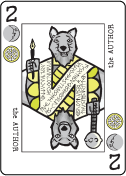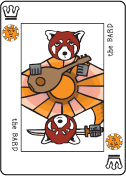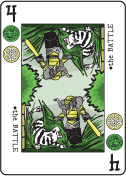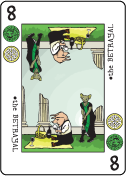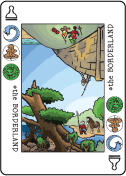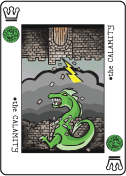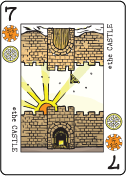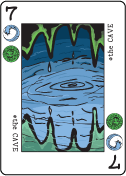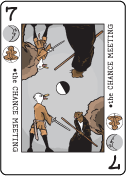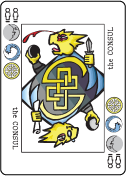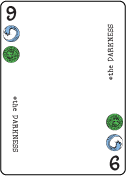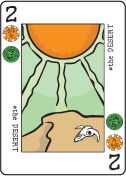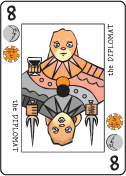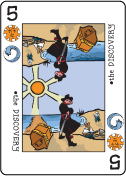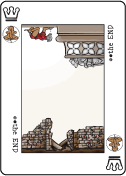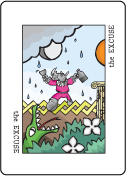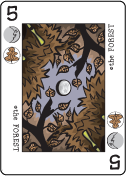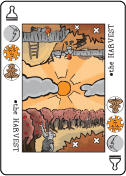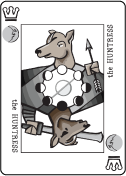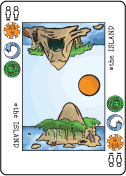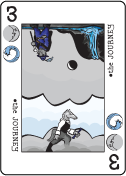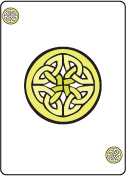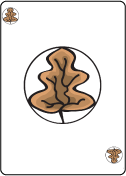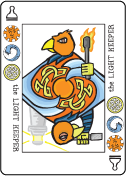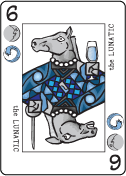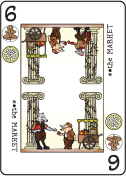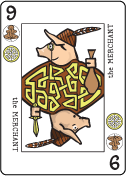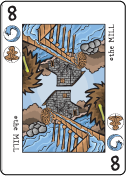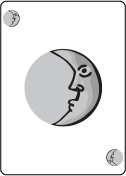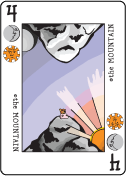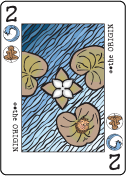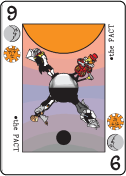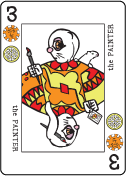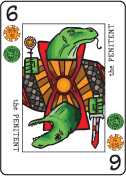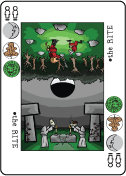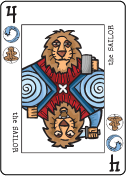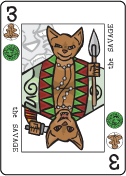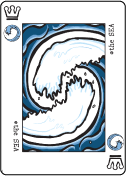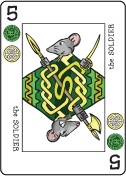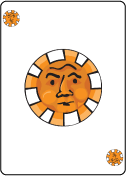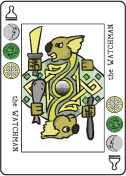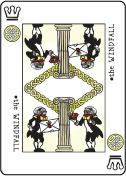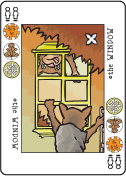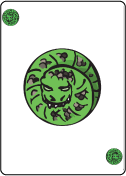Pandemonium deck: Difference between revisions
imported>Wordman mNo edit summary |
imported>Wordman mNo edit summary |
||
| Line 120: | Line 120: | ||
== Completing the deck == | == Completing the deck == | ||
Should one character assemble the complete deck, | Should one character assemble the complete deck, it reveals its true power. Details of a ritual lasting ten minutes and culminating with cards being drawn from the deck are implanted in the owner's mind. The deck (and, therefore, the effects listed below) considers those present at the ritual fall into one of three categories: | ||
* The '''reader''' is the character performing the ritual. This is the deck's owner. If one person gives the deck to another in order for them to become the reader, the recipient immediately becomes the deck's new owner (able to use all its powers) and is under no particular obligation to give the deck back. | |||
* The '''querent''' is the character who will draw from the deck and be targeted by the resulting effect. In the descriptions of major effects below, "you" refers to the querent. The querent cannot be the same character as the reader. | |||
* The '''witnesses'' are everyone present at the ritual, not including the reader or the querent. Witnesses are just spectators most of the time, but some major effects target the witnesses. | |||
Some major effects also cause additional cards from the deck to vanish and reappear elsewhere. This may happen in one of three ways | At the climax of the ritual, the querent draws cards from the deck. If lawful, the querent may draw only one card. If chaotic, the querent draw up to three cards. Otherwise the the querent may draw up to two cards. Once the cards are drawn, the reader chooses one of the drawn cards, and the major effect listed for that card activates, targeting the querent. Major effects are permanent and cannot be eliminated without powerful magic, such as a ''wish'' or ''miracle''. | ||
Afterwards, each card drawn disintegrates and reforms at a random location (as mentioned above). The reader immediately becomes aware of the new location of the card that was activated (but not the other cards drawn, if any). No longer in possession of a complete deck, the owner must track down the lost cards in order to complete the deck and draw again. Note that, since the new cards are not technically the same object as the cards that were drawn, the deck's owner has never handled the new cards, which prevents divination spells that require such handling from locating the new cards. | |||
Some major effects also cause additional cards from the deck to vanish and reappear elsewhere. This may happen in one of three ways: | |||
* When the deck '''divides''', undrawn cards are placed at random into four separate piles, as evenly as possible. One pile, chosen at random, remains where it is. The other piles teleport to random locations within 100 miles. | |||
* When the deck is '''distributed''' to a specific group, undrawn cards are randomly allocated to the creatures in the group mentioned in the text, as evenly as possible. | |||
* When the deck '''scatters''', all undrawn cards teleport to random locations within 2,000 miles. | |||
== Consciousness == | == Consciousness == | ||
| Line 130: | Line 140: | ||
Created to spread chaos, the ''deck'' possesses a rudimentary consciousness which helps further that aim. This consciousness wants the cards to be found and used, so whenever cards transfer to new locations, they will never wind up anywhere too obscure or unaccessible (e.g. surrounded by solid rock, the bottom of unclimbable ravine, etc.). Instead, they tend to appear in places where they might get found eventually (e.g. the bottom of a chest in an attic, the pocket of a rarely used coat, tucked into a library book, a family crypt, etc.). The deck is most content when its presence sows discord or upsets the status quo, and favors getting cards into the hands of destabilizing forces (like your average group of PCs). | Created to spread chaos, the ''deck'' possesses a rudimentary consciousness which helps further that aim. This consciousness wants the cards to be found and used, so whenever cards transfer to new locations, they will never wind up anywhere too obscure or unaccessible (e.g. surrounded by solid rock, the bottom of unclimbable ravine, etc.). Instead, they tend to appear in places where they might get found eventually (e.g. the bottom of a chest in an attic, the pocket of a rarely used coat, tucked into a library book, a family crypt, etc.). The deck is most content when its presence sows discord or upsets the status quo, and favors getting cards into the hands of destabilizing forces (like your average group of PCs). | ||
When adjudicating matters related to the ''deck'', keep the desires of this consciousness in mind. Take the Windfall card, for example, which makes | When adjudicating matters related to the ''deck'', keep the desires of this consciousness in mind. Take the Windfall card, for example, which makes the querent heir to a noble title. While this might result in a character taking up the reins of power peacefully, the ''deck'' would much prefer that a full on civil war broke out instead. Along the same lines, the ''deck'' wants people to fight over its cards when trying to unify the deck. | ||
== The Notoriety == | == The Notoriety == | ||
| Line 155: | Line 165: | ||
'''Major Effect''' (Neutral) On the first new moon of each season, you may make a ''[[pfsrd-spell:w/wish|wish]]'' on behalf of someone you hadn't met before drawing the card or since you made your last ''wish''. The person for whom you are wishing must have articulated a desire for the wish to you in some way. | '''Major Effect''' (Neutral) On the first new moon of each season, you may make a ''[[pfsrd-spell:w/wish|wish]]'' on behalf of someone you hadn't met before drawing the card or since you made your last ''wish''. The person for whom you are wishing must have articulated a desire for the wish to you in some way. | ||
'''Notoriety''' Rumors spread that the | '''Notoriety''' Rumors spread that the querent grants wishes, but most of them are coupled with untruthful riders about what the character wants (or must have) in order to grant one. For example, a story starts to circulate in the village the character just entered that the first person who presents her with a cup filled with the blood of a sacrificed virgin will be granted a wish. Or that wishes are only granted to those who truly hate the character's race. Or that whoever sleeps with the character under a full moon automatically gets their wish. | ||
</div> | </div> | ||
| Line 166: | Line 176: | ||
'''Influence Effect''' You gain a +4 luck bonus to charisma. | '''Influence Effect''' You gain a +4 luck bonus to charisma. | ||
'''Major Effect''' (Good) You gain an alter ego as a notorious bard. Create a character with different gender and race than your main character, but with the same number of character levels (all taken in bard levels). You (with input from the GM) may outfit the bard with 40,000gp worth of equipment. Three times per day, you may spend one minute transforming from your main character to the bard, or vice-versa. The two characters are aware of each other, but maintain separate personalities, motivations and memories. Personal possessions are tracked separately, and | '''Major Effect''' (Good) You gain an alter ego as a notorious bard. Create a character with different gender and race than your main character, but with the same number of character levels (all taken in bard levels). You (with input from the GM) may outfit the bard with 40,000gp worth of equipment. Three times per day, you may spend one minute transforming from your main character to the bard, or vice-versa. The two characters are aware of each other, but maintain separate personalities, motivations and memories. Personal possessions are tracked separately, and swap when the other character takes over. Experience gained by either character is applied to both. If you are already a bard, this new bard is a bitter rival. | ||
If the new moon rises and you have not switched since the rise of the last new moon, you automatically transform into your other self, and may not switch back until the next new moon. | If the new moon rises and you have not switched since the rise of the last new moon, you automatically transform into your other self, and may not switch back until the next new moon. | ||
'''Notoriety''' Whenever the | '''Notoriety''' Whenever the querent arrives in a new town or other major area (either as herself or the bard), the Notoriety plants memories in key residents of the location of some past trouble or scandal the bard caused. Perhaps the bard seduced a local noble, or performed a song that insulted the local religion or stole from the local blacksmith guild. | ||
</div> | </div> | ||
| Line 183: | Line 193: | ||
'''Major Effect''' (Bad) The deck divides. Whenever you, or a faction to which you have sworn allegiance, is involved in open conflict involving more than 100 people, your side always loses (though you may survive). A "faction" refers to some group, organization, army, nation or other body that might enter into conflict with similar factions. If you somehow manage to swear allegiance to more than one conflicting faction, all of them loose (either through mutual destruction or by one gaining a victory that costs it more than it gains). Any time you swear allegiance to a faction, the ''deck'' places a ''[[pfsrd-spell:g/geas|geas]]'' on you (as a level 20 caster) to honor your pledge until you are released from it. When your faction loses a battle, they may release you from your pledge, but are under no obligation to do so. | '''Major Effect''' (Bad) The deck divides. Whenever you, or a faction to which you have sworn allegiance, is involved in open conflict involving more than 100 people, your side always loses (though you may survive). A "faction" refers to some group, organization, army, nation or other body that might enter into conflict with similar factions. If you somehow manage to swear allegiance to more than one conflicting faction, all of them loose (either through mutual destruction or by one gaining a victory that costs it more than it gains). Any time you swear allegiance to a faction, the ''deck'' places a ''[[pfsrd-spell:g/geas|geas]]'' on you (as a level 20 caster) to honor your pledge until you are released from it. When your faction loses a battle, they may release you from your pledge, but are under no obligation to do so. | ||
'''Notoriety''' A prophesy surfaces that any military force which claims the allegiance of the "chosen one" (who bears an uncanny resemblance to the | '''Notoriety''' A prophesy surfaces that any military force which claims the allegiance of the "chosen one" (who bears an uncanny resemblance to the querent) cannot be defeated. Those who learn of this prophesy may make tempting offers or apply terrible leverage to gain the character's allegiance. | ||
</div> | </div> | ||
| Line 194: | Line 204: | ||
'''Influence Effect''' You may cast ''[[pfsrd-spell:c/confess|confess]]'' at will as a spell-like ability. If cast on an ally, add +4 to the save DC. | '''Influence Effect''' You may cast ''[[pfsrd-spell:c/confess|confess]]'' at will as a spell-like ability. If cast on an ally, add +4 to the save DC. | ||
'''Major Effect''' (Bad) If you die, all allied player characters in your party gain 10,000xp each. If the lethal blow was dealt by an ally (not necessarily the other PCs), this award increases to enough experience to advance each PC in your party to the next level, or 25,000xp, whichever is higher. Should you be raised or otherwise brought back from the dead, this xp is lost. If you own the ''deck'' when you die, it is distributed to your main allies ( | '''Major Effect''' (Bad) If you die, all allied player characters in your party gain 10,000xp each. If the lethal blow was dealt by an ally (not necessarily the other PCs), this award increases to enough experience to advance each PC in your party to the next level, or 25,000xp, whichever is higher. Should you be raised or otherwise brought back from the dead, this xp is lost. If you own the ''deck'' when you die, it is distributed to your main allies (with the ally who delivered the killing strike, if any, gaining two shares of the distribution). | ||
'''Notoriety''' If the | '''Notoriety''' If the querent does anything counter to the interests of another PC, the Notoriety sees to it the PC finds out about it. Also, animal companions, familiars and the like of ''all'' witnesses become convinced that if they arrange the death of their master, they will be set free. | ||
</div> | </div> | ||
| Line 209: | Line 219: | ||
'''Major Effect''' (Neutral) You become a native of the Ethereal Plane, gaining the [[pfsrd:gamemastering/special-abilities#TOC-Ethereal|Ethereal]] special ability. You can shift from the Ethereal Plane to the Material Plane as a free action, and shift back again as a move action (or as part of a move action), but you may remain in the Material Plane no more a number of consecutive rounds equal to your Constitution score. You may take a single willing or helpless creature with you when switching planes. You also gain the ability to control [[pfsrd:bestiary/monster-listings/magical-beasts/phase-spider|phase spiders]], casting ''[[pfsrd-spell:d/dominate-monster|dominate monster]]'' once per day as a spell-like ability, provided the target is a phase spider. | '''Major Effect''' (Neutral) You become a native of the Ethereal Plane, gaining the [[pfsrd:gamemastering/special-abilities#TOC-Ethereal|Ethereal]] special ability. You can shift from the Ethereal Plane to the Material Plane as a free action, and shift back again as a move action (or as part of a move action), but you may remain in the Material Plane no more a number of consecutive rounds equal to your Constitution score. You may take a single willing or helpless creature with you when switching planes. You also gain the ability to control [[pfsrd:bestiary/monster-listings/magical-beasts/phase-spider|phase spiders]], casting ''[[pfsrd-spell:d/dominate-monster|dominate monster]]'' once per day as a spell-like ability, provided the target is a phase spider. | ||
'''Notoriety''' Rumors circulate among natives to the Ethereal Plane (such as [[pfsrd:bestiary/monster-listings/outsiders/xill|xill]]) regarding the | '''Notoriety''' Rumors circulate among natives to the Ethereal Plane (such as [[pfsrd:bestiary/monster-listings/outsiders/xill|xill]]) regarding the querent. The nature of these rumors is up the the GM but might include things like: "the character intends to conquer the ethereal plane", "the character will save us from our enemies", "the character is destined to lead us in war against the Material Plane", etc. In addition, ethereal natives within three miles of the character are filled with an odd restlessness which encourages them to visit the Material Plane. It doesn't take long for those who travel with the character to gain a reputation for attracting ethereal mischief. | ||
</div> | </div> | ||
| Line 220: | Line 230: | ||
'''Influence Effect''' You gain a +4 luck bonus to strength. | '''Influence Effect''' You gain a +4 luck bonus to strength. | ||
'''Major Effect''' (Bad) In 1d4 days, you will witness a massive natural catastrophe which threatens to wipe out all life on your world. Perhaps a great rock falls from the sky, igniting massive fires and kicking up dust that blots out the sun. Maybe volcanoes erupt, flooding the land with molten rock and poisonous air. Maybe quakes drop the earth, allowing the ocean to rush over the land. Maybe fire ejected from the sun scorches the half the surface. Maybe a rift to another plane starts swallowing the world. Whatever occurs, you and all | '''Major Effect''' (Bad) In 1d4 days, you will witness a massive natural catastrophe which threatens to wipe out all life on your world. Perhaps a great rock falls from the sky, igniting massive fires and kicking up dust that blots out the sun. Maybe volcanoes erupt, flooding the land with molten rock and poisonous air. Maybe quakes drop the earth, allowing the ocean to rush over the land. Maybe fire ejected from the sun scorches the half the surface. Maybe a rift to another plane starts swallowing the world. Whatever occurs, you, the reader and all witnesses will miraculously survive the initial effects, left to make your way in the broken world. | ||
'''Notoriety''' Any survivor who invests any sort of trust in the | '''Notoriety''' Any survivor who invests any sort of trust in the querent will, sooner or later, discover that the character was responsible for the calamity. | ||
</div> | </div> | ||
| Line 250: | Line 260: | ||
'''Influence Effect''' You become isolated from the rest of the combat. Targeting you with an attack or spell requires a successful Will save (DC 18). Likewise, you must make a similar save to target an opponent with an attack or spell. Untargeted effects are not affected. | '''Influence Effect''' You become isolated from the rest of the combat. Targeting you with an attack or spell requires a successful Will save (DC 18). Likewise, you must make a similar save to target an opponent with an attack or spell. Untargeted effects are not affected. | ||
'''Major Effect''' (Bad) You, and all | '''Major Effect''' (Bad) You, the reader, and all witnesses, are teleported to random locations within a cavern somewhere in the middle a megadungeon (probably, but not necessarily, on your home world or plane). You arrive naked, with your possessions scattered at random into the megadungeon. Others retain anything they were holding and any armor, clothing or jewelry, but other possessions (bags, packs, sheathed weapons, etc.) are similarly scattered. The ''deck'' divides, but all four stacks appear at random in the megadungeon. For the next two days, any intelligent creature in the megadungeon may cast ''[[pfsrd-spell:l/locate-object|locate object]]'' at will as a spell-like ability. | ||
'''Notoriety''' Intelligent denizens of the megadungeon become vaguely aware that the group's possessions have newly arrived in the dungeon. Some inherit intimate knowledge of the details of some of the items, as if having firsthand observation of them. | '''Notoriety''' Intelligent denizens of the megadungeon become vaguely aware that the group's possessions have newly arrived in the dungeon. Some inherit intimate knowledge of the details of some of the items, as if having firsthand observation of them. | ||
| Line 265: | Line 275: | ||
'''Major Effect''' (Good) You suddenly and vividly remember a seemingly innocuous encounter with a typical stranger (for example, a merchant who sold you something or a serving girl), with the realization that the stranger wasn't mortal at all, but a deity (or other powerful being of similar alignment to you) in disguise. Something transpired during that encounter which caused the deity to taking a shining to you. You and your GM will determine when this occurred and who the deity is (if necessary, make up a new scene and insert it in some logical place in the past). Now revealed, the deity will make a point to visit you once a month for a quick chat. | '''Major Effect''' (Good) You suddenly and vividly remember a seemingly innocuous encounter with a typical stranger (for example, a merchant who sold you something or a serving girl), with the realization that the stranger wasn't mortal at all, but a deity (or other powerful being of similar alignment to you) in disguise. Something transpired during that encounter which caused the deity to taking a shining to you. You and your GM will determine when this occurred and who the deity is (if necessary, make up a new scene and insert it in some logical place in the past). Now revealed, the deity will make a point to visit you once a month for a quick chat. | ||
'''Notoriety''' Priests of the deity instantly recognize the | '''Notoriety''' Priests of the deity instantly recognize the querent as favored by their god. Rumors may circulate about the regular meetings and may result in surveillance or worse, as the faithful try to see divinity in the flesh. Enemies of the deity eventually become aware that the character is favored. | ||
</div> | </div> | ||
| Line 276: | Line 286: | ||
'''Influence Effect''' You may spend a standard action to heal all ability damage to your Wisdom, Dexterity and Intelligence. You may spend a standard action to heal all ability drain to either your Wisdom, Dexterity or Intelligence. | '''Influence Effect''' You may spend a standard action to heal all ability damage to your Wisdom, Dexterity and Intelligence. You may spend a standard action to heal all ability drain to either your Wisdom, Dexterity or Intelligence. | ||
'''Major Effect''' (Neutral) A powerful outsider appears and introduces itself to you. It claims to be an emissary from its home plane, sent to study the Material Plane, and has chosen to focus its study on you. It will remain by your side, watching all you do, asking questions about events and people around it. It is friendly and will gladly assist you, if asked, but will be largely oblivious to any collateral damage or effects its presence causes. No amount of argument will persuade the outsider from leaving you alone, not even ''[[pfsrd-spell:b/banishment|banishment]]'' (which automatically fails, though ''[[pfsrd-spell:w/wish|wish]]'' or ''[[pfsrd-spell:m/miracle|miracle]]'' will work). If killed, a replacement is sent within 1d6 days (either the original restored or a new outsider sent to carry on the original's work). The type outsider depends on your alignment. If you are good, the emissary is a :bestiary/monster-listings/outsiders/azata/azata-brijidine|brijidine]]. If you are evil, the emissary is a [[pfsrd:bestiary/monster-listings/outsiders/demon/marilith|marilith]]. Otherwise, it is a [[pfsrd:bestiary/monster-listings/outsiders/protean/protean-keketar|keketar]]. | '''Major Effect''' (Neutral) A powerful outsider appears and introduces itself to you. It claims to be an emissary from its home plane, sent to study the Material Plane, and has chosen to focus its study on you. It will remain by your side, watching all you do, asking questions about events and people around it. It is friendly and will gladly assist you, if asked, but will be largely oblivious to any collateral damage or effects its presence causes. No amount of argument will persuade the outsider from leaving you alone, not even ''[[pfsrd-spell:b/banishment|banishment]]'' (which automatically fails, though ''[[pfsrd-spell:w/wish|wish]]'' or ''[[pfsrd-spell:m/miracle|miracle]]'' will work). If killed, a replacement is sent within 1d6 days (either the original restored or a new outsider sent to carry on the original's work). The type outsider depends on your alignment. If you are good, the emissary is a [[pfsrd:bestiary/monster-listings/outsiders/azata/azata-brijidine|brijidine]]. If you are evil, the emissary is a [[pfsrd:bestiary/monster-listings/outsiders/demon/marilith|marilith]]. Otherwise, it is a [[pfsrd:bestiary/monster-listings/outsiders/protean/protean-keketar|keketar]]. | ||
'''Notoriety''' Given the nature of the outsiders which may appear, the Notoriety need not spend any effort spreading news that the | '''Notoriety''' Given the nature of the outsiders which may appear, the Notoriety need not spend any effort spreading news that the querent now has the emissary attached to her him: the outsider's behavior will likely do that on its own. Should the character or her allies kill the emissary, however, other (possibly stronger) outsiders of the same type will hear of it. | ||
</div> | </div> | ||
| Line 304: | Line 314: | ||
'''Major Effect''' (Bad) You begin to [[pfsrd:gamemastering/environment/environmental-rules#TOC-Starvation-and-Thirst|dehydrate]], even if you do not normally require water. No amount of drinking can counter this effect. If (when) you die, you immediately gain the [[pfsrd:bestiary/monster-listings/templates/dread-mummy-template|dread mummy template]] (though you retain your alignment) and the dehydration effect stops. Your [[pfsrd:gamemastering/afflictions/curses/mummy-rot|mummy rot]] is particularly virulent (DC 18 + your Cha bonus). Once you become a mummy, each day there is a 20% chance that a [[pfsrd:gamemastering/environment/wilderness/terrain/desert-terrain#TOC-Sandstorm|sandstorm]] will engulf everything within a five mile radius of you, lasting for one hour. Accumulated sand from these storms will eventually smother crops, choke rivers and obscure roads. If you consume the eyes of a sentient being at the start of the day, no storm will come that day. | '''Major Effect''' (Bad) You begin to [[pfsrd:gamemastering/environment/environmental-rules#TOC-Starvation-and-Thirst|dehydrate]], even if you do not normally require water. No amount of drinking can counter this effect. If (when) you die, you immediately gain the [[pfsrd:bestiary/monster-listings/templates/dread-mummy-template|dread mummy template]] (though you retain your alignment) and the dehydration effect stops. Your [[pfsrd:gamemastering/afflictions/curses/mummy-rot|mummy rot]] is particularly virulent (DC 18 + your Cha bonus). Once you become a mummy, each day there is a 20% chance that a [[pfsrd:gamemastering/environment/wilderness/terrain/desert-terrain#TOC-Sandstorm|sandstorm]] will engulf everything within a five mile radius of you, lasting for one hour. Accumulated sand from these storms will eventually smother crops, choke rivers and obscure roads. If you consume the eyes of a sentient being at the start of the day, no storm will come that day. | ||
'''Notoriety''' Among those affected by the sandstorms, a previously obscure legend arises, claiming that an ancient monarch will rise from the dead to | '''Notoriety''' Among those affected by the sandstorms, a previously obscure legend arises, claiming that an ancient monarch will rise from the dead to eat the eyes of the living, turning their lands into a desert, and that the vengeful ruler will be served by several living heralds. | ||
</div> | </div> | ||
| Line 317: | Line 327: | ||
'''Major Effect''' (Good) During the next full solar eclipse (or similarly rare celestial event), you will be able to issue a single request to any creature in the multiverse and have it fulfilled. For the duration of that request, the target is affected as if by the spell ''[[pfsrd-spell:d/dominate-monster|dominate monster]]'', but also uses any mental gymnastics required to convince itself that the request is in its best interest and will oblige, even at the cost of the target's own destruction (note that not all creatures, immortals in particular, can truly die). It will, however, remember the source of the command. | '''Major Effect''' (Good) During the next full solar eclipse (or similarly rare celestial event), you will be able to issue a single request to any creature in the multiverse and have it fulfilled. For the duration of that request, the target is affected as if by the spell ''[[pfsrd-spell:d/dominate-monster|dominate monster]]'', but also uses any mental gymnastics required to convince itself that the request is in its best interest and will oblige, even at the cost of the target's own destruction (note that not all creatures, immortals in particular, can truly die). It will, however, remember the source of the command. | ||
'''Notoriety''' Prior to the next full solar eclipse, every chaotic deity with influence on the world of the | '''Notoriety''' Prior to the next full solar eclipse, every chaotic deity with influence on the world of the querent learns of the character's pending ability. Some will likely attempt to influence what the character does with it. Some time after the ability is used, the Notoriety may plant doubts in the target's head that fulfilling request was in his best interest (even if it actually was) or that he was manipulated into it. | ||
</div> | </div> | ||
| Line 330: | Line 340: | ||
'''Major Effect''' (Good) When you take a walk on a beach during sunrise of the first day of the year while focussing on a single question or puzzle, the full answer or solution to that question becomes obvious to you and everyone else in the world. Whether the information revealed can be effectively acted upon is another question entirely. | '''Major Effect''' (Good) When you take a walk on a beach during sunrise of the first day of the year while focussing on a single question or puzzle, the full answer or solution to that question becomes obvious to you and everyone else in the world. Whether the information revealed can be effectively acted upon is another question entirely. | ||
'''Notoriety''' | '''Notoriety''' Once this ability is used, those who spend time pondering difficult to answer questions will find themselves drawn to the querent. | ||
</div> | </div> | ||
| Line 341: | Line 351: | ||
'''Influence Effect''' You gain a +4 luck bonus to constitution. | '''Influence Effect''' You gain a +4 luck bonus to constitution. | ||
'''Major Effect''' (Bad) | '''Major Effect''' (Bad) You, the reader and the witnesses all take 240 points of damage as the universe attempts to unmake you. Making a Fortitude save (DC 32) reduces this damage to 10d6. Any reduced to zero or fewer hit points has their body unmade completely. You, as the one who drew the card, not only fail this saving throw automatically, but are also unmade regardless of how much damage you take. All that remains of anyone unmade are their items and a glowing gem containing their soul, which functions like an [[pfsrd:magic-items/wondrous-items/wondrous-items/m-p/orb-of-utter-chaos|orb of utter chaos]]. If all present at the ceremony are unmade, the deck scatters, as do all of the gems. A ''[[pfsrd-spell:r/resurrection|resurrection]]'' or stronger spell will restore anyone trapped in a gem, destroying the stone in the process. | ||
'''Notoriety''' The gems created when the card is drawn eventually take on legends of their own, including false, but widely believed, rumors that anyone resurrecting the soul inside will be granted three ''[[pfsrd-spell:w/wishes|wishes]]''. | '''Notoriety''' The gems created when the card is drawn eventually take on legends of their own, including false, but widely believed, rumors that anyone resurrecting the soul inside will be granted three ''[[pfsrd-spell:w/wishes|wishes]]''. | ||
| Line 369: | Line 379: | ||
'''Major Effect''' (Neutral) Every other person at your gaming table (including the GM, but not including you) presents a short vision of the future. At least one of these visions will come true, but you are not sure which; however, you may sacrifice yourself in order to select which vision comes true. If you do, you drop dead and half of your magical possessions vanish. You may be raised as normal, but only a ''[[pfsrd-spell:w/wish|wish]]'' or ''[[pfsrd-spell:m/miracle|miracle]]'' will prevent the future you have selected. [Note: groups are encouraged to take some time to come up with their visions, even stopping the game for the day and presenting the visions next session.] If you choose not to sacrifice yourself, the GM chooses which vision comes true. | '''Major Effect''' (Neutral) Every other person at your gaming table (including the GM, but not including you) presents a short vision of the future. At least one of these visions will come true, but you are not sure which; however, you may sacrifice yourself in order to select which vision comes true. If you do, you drop dead and half of your magical possessions vanish. You may be raised as normal, but only a ''[[pfsrd-spell:w/wish|wish]]'' or ''[[pfsrd-spell:m/miracle|miracle]]'' will prevent the future you have selected. [Note: groups are encouraged to take some time to come up with their visions, even stopping the game for the day and presenting the visions next session.] If you choose not to sacrifice yourself, the GM chooses which vision comes true. | ||
'''Notoriety''' Those with a vested interest in preventing the chosen future are granted the same vision of it the | '''Notoriety''' Those with a vested interest in preventing the chosen future are granted the same vision of it the querent did. Their actions to prevent the vision will, of course, be instrumental in making it happen. | ||
</div> | </div> | ||
| Line 380: | Line 390: | ||
'''Influence Effect''' You can sift through the surface thoughts of those around you, as if under the effects of a ''[[pfsrd-spell:s/seek-thoughts|seek thoughts]]'' spell. | '''Influence Effect''' You can sift through the surface thoughts of those around you, as if under the effects of a ''[[pfsrd-spell:s/seek-thoughts|seek thoughts]]'' spell. | ||
'''Major Effect''' (Good) A dark gem materializes in place of the card, containing what the [[pfsrd:bestiary/monster-listings/outsiders/daemons#TOC-The-Soul-Trade|soul trade]] considers a priceless unique soul. Within hours, a [[pfsrd:bestiary/monster-listings/outsiders/devil/barbed|barbed devil]] contacts you. It represents one Hell's most reputable soul auction houses, and presents an offer to auction the soul for you, in exchange for a 10% commission. It strongly suggests you take, for an additional 5%, the auction house's offer the protection of their vaults for the soul until auction time, and will happily agree to a binding contract keeping everyone honest. The devil will remind you how seriously Hell takes contracts and will deal fairly with you at all times (the prestige the auction house will gain by selling this soul outweighs any advantage they might gain from trying trick you, by several orders of magnitude). Should you take the offer, | '''Major Effect''' (Good) A dark gem materializes in place of the card, containing what the [[pfsrd:bestiary/monster-listings/outsiders/daemons#TOC-The-Soul-Trade|soul trade]] considers a priceless unique soul. Within hours, a [[pfsrd:bestiary/monster-listings/outsiders/devil/barbed|barbed devil]] contacts you. It represents one Hell's most reputable soul auction houses, and presents an offer to auction the soul for you, in exchange for a 10% commission. It strongly suggests you take, for an additional 5%, the auction house's offer the protection of their vaults for the soul until auction time, and will happily agree to a binding contract keeping everyone honest. The devil will remind you how seriously Hell takes contracts and will deal fairly with you at all times (the prestige the auction house will gain by selling this soul outweighs any advantage they might gain from trying trick you, by several orders of magnitude). Should you take the offer, you, the reader and the witnesses are invited to attend the auction. The GM will determine who the interested buyers are based on your initial asking price, and will determine the winner and final price. | ||
Additionally, all | Additionally, the reader and witnesses all gain the [[pfsrd:bestiary/monster-listings/outsiders/daemons/cacodaemon#TOC-Soul-Lock-Su-|Soul Lock]] special ability, as if they were a [[pfsrd:bestiary/monster-listings/outsiders/daemons/cacodaemon|cacodæmon]]. Soul gems generated with this ability may be traded (perhaps using contacts made at the auction), but harvesting souls in this way is considered an evil act. | ||
'''Notoriety''' The outer | '''Notoriety''' The outer planes nearly ignite with the news that this soul gem exists. Should the querent refuse the protection of the auction house, interested parties will definitely come after the soul directly. | ||
</div> | </div> | ||
| Line 395: | Line 405: | ||
'''Influence Effect''' You gain a +4 luck bonus to wisdom. | '''Influence Effect''' You gain a +4 luck bonus to wisdom. | ||
'''Major Effect''' (Neutral) Rakshasas believe that each and every creature in the universe has a proper role to play, and a (usually) female [[pfsrd:bestiary/monster-listings/outsiders/rakshasa/rakshasa-maharaja|rajadhiraja]] strongly believes that your role is to mate with her and produce her child (even if she has to polymorph you or herself to do so). You, and | '''Major Effect''' (Neutral) Rakshasas believe that each and every creature in the universe has a proper role to play, and a (usually) female [[pfsrd:bestiary/monster-listings/outsiders/rakshasa/rakshasa-maharaja|rajadhiraja]] strongly believes that your role is to mate with her and produce her child (even if she has to polymorph you or herself to do so). You, the reader and the witnesses become permanently immune to any compulsion magic she might use on you, including her ''[[pfsrd-spell:d/dominate-monster|dominate monster]]'' ability and, in any case, she prefers a willing mate, so she must woo you. | ||
'''Notoriety''' Militant religious zealots become convinced that the rajadhiraja and the | '''Notoriety''' Militant religious zealots become convinced that the rajadhiraja and the querent will spawn a child destined to destroy the world (even if the character obviously spurs her advances). | ||
</div> | </div> | ||
| Line 408: | Line 418: | ||
'''Influence Effect''' You may spend a standard action to heal all ability damage to your Charisma, Dexterity and Strength. You may spend a standard action to heal all ability drain to either your Charisma, Dexterity or Strength. | '''Influence Effect''' You may spend a standard action to heal all ability damage to your Charisma, Dexterity and Strength. You may spend a standard action to heal all ability drain to either your Charisma, Dexterity or Strength. | ||
'''Major Effect''' (Neutral) | '''Major Effect''' (Neutral) some kind of effect that radiates from character forming an island around her. | ||
'''Notoriety''' | '''Notoriety''' | ||
| Line 434: | Line 444: | ||
'''Influence Effect''' You receive a +6 luck bonus on all skill checks. | '''Influence Effect''' You receive a +6 luck bonus on all skill checks. | ||
'''Major Effect''' (Bad) The deck | '''Major Effect''' (Bad) The deck is distributed among the witnesses. You are taken captive as if by an ''[[pfsrd-spell:i/imprisonment|imprisonment]]'' spell with no saving throw. You retain all possessions on your person. Anyone who frees you will be able to place a ''[[pfsrd-spell:g/geas|geas]]'' on you (no save) and be granted a ''[[pfsrd-spell:l/limited-wish|limited wish]]''. | ||
The location of the drawing ritual now becomes the one place where you can be freed (using a ''[[pfsrd-spell:f/freedom|freedom]]'' spell). If you are good, the location becomes ''[[pfsrd-spell:u/unhallow|unhallowed]]''. If you are evil, the location becomes ''[[pfsrd-spell:h/hallow|hallowed]]''. Within 1d10 minutes, an inquisition of six [[pfsrd:bestiary/monster-listings/outsiders/inevitable/inevitable-kolyarut|kolyaruts]] materializes, intent on preventing anyone from freeing you. Anyone brought to zero hit points (or zero levels) by one of these inevitables does not die, but is similarly ''imprisoned'' (fully healed and offering the the same benefits to any who free them). Any of the inevitables which are killed reform within 1d6 hours. | |||
'''Notoriety''' | '''Notoriety''' All beings in the world become magically aware that the querent has been imprisoned, as well as the consequences for releasing her. Some receive hints as to the location where the querent can be freed. | ||
</div> | </div> | ||
| Line 460: | Line 472: | ||
'''Influence Effect''' You can see magical auras, as if under the effects of ''[[pfsrd-spell:a/arcane-sight|arcane sight]]''. | '''Influence Effect''' You can see magical auras, as if under the effects of ''[[pfsrd-spell:a/arcane-sight|arcane sight]]''. | ||
'''Major Effect''' (Neutral) You gain a reputation as a prophet. At least once a day, when your conversation can be overheard in public, at least one eavesdropper will be filled with the conviction that one of your comments, however innocuous, is the key to some great life-changing truth. If you engage in any sort of public oratory, 1d10 people in the crowd will be similarly affected. Unfortunately, you have no control over which statements will be latched onto by the listeners. Affected listeners will largely rearrange their life in order to pursue this truth. Some will try to follow you anywhere you goes. Others will openly worship you and do anything you ask (other than stop following you) | '''Major Effect''' (Neutral) You gain a reputation as a prophet. At least once a day, when your conversation can be overheard in public, at least one eavesdropper will be filled with the conviction that one of your comments, however innocuous, is the key to some great life-changing truth. If you engage in any sort of public oratory, 1d10 people in the crowd will be similarly affected. Unfortunately, you have no control over which statements will be latched onto by the listeners. Affected listeners will largely rearrange their life in order to pursue this truth. Some will try to follow you anywhere you goes. Others will openly worship you and do anything you ask (other than stop following you). | ||
'''Notoriety''' | '''Notoriety''' As the number of followers increases, debates will likely arise among the faithful, as most of them will be reacting to different, possibly contradictory, statements made by you, which may even give rise to violence and schisms. Religious and political leaders may also react to a growing cult in their midst. | ||
</div> | </div> | ||
| Line 758: | Line 770: | ||
'''Major Effect''' (Bad) You transform into a true dragon of your same alignment, replacing its stats and abilities for your own. Your dragon age is determined by finding the lowest CR rating for that type of dragon that is higher than your character level. (For example, a 15th level CN character might become a [[pfsrd:bestiary/monster-listings/dragons/dragon/-primal-cloud/cloud-dragon-old|old cloud dragon]] or an [[pfsrd:bestiary/monster-listings/dragons/dragon/-primal-magma/magma-dragon-very-old|very old magma dragon]], which are both CR 16). You retain your possessions, but if your new body cannot make use of them, they fall to the ground beside you. At the same time, an amulet bearing the likeness of your new draconic form materializes around the next of someone else present at the drawing ritual (determined randomly, though any with an amulet slot already filled are skipped). Whoever wears this amulet gains the ability to command your actions, as if by ''[[pfsrd-spell:d/dominate-monster|dominate monster]]'', without any possibility for a saving throw, ever. Should the amulet be destroyed, you are no longer dominated, but revert back to your original form. Other than a ''[[pfsrd-spell:w/wish|wish]]'' or ''[[pfsrd-spell:m/miracle|miracle]]'', destroying the amulet requires breath from three dragons, who must each have different types of breath weapon, none of which is shared with your type of breath weapon. Should you die as a dragon, the amulet turns to dust. | '''Major Effect''' (Bad) You transform into a true dragon of your same alignment, replacing its stats and abilities for your own. Your dragon age is determined by finding the lowest CR rating for that type of dragon that is higher than your character level. (For example, a 15th level CN character might become a [[pfsrd:bestiary/monster-listings/dragons/dragon/-primal-cloud/cloud-dragon-old|old cloud dragon]] or an [[pfsrd:bestiary/monster-listings/dragons/dragon/-primal-magma/magma-dragon-very-old|very old magma dragon]], which are both CR 16). You retain your possessions, but if your new body cannot make use of them, they fall to the ground beside you. At the same time, an amulet bearing the likeness of your new draconic form materializes around the next of someone else present at the drawing ritual (determined randomly, though any with an amulet slot already filled are skipped). Whoever wears this amulet gains the ability to command your actions, as if by ''[[pfsrd-spell:d/dominate-monster|dominate monster]]'', without any possibility for a saving throw, ever. Should the amulet be destroyed, you are no longer dominated, but revert back to your original form. Other than a ''[[pfsrd-spell:w/wish|wish]]'' or ''[[pfsrd-spell:m/miracle|miracle]]'', destroying the amulet requires breath from three dragons, who must each have different types of breath weapon, none of which is shared with your type of breath weapon. Should you die as a dragon, the amulet turns to dust. | ||
'''Notoriety''' Any true dragons who see either the amulet or the | '''Notoriety''' Any true dragons who see either the amulet or the querent in dragon form become instantly aware of the connection between the two and how they were created. While many dragons will react with the same sort of vitriol they feel towards ''[[pfsrd:magic-items/artifacts/major-artifacts/orbs-of-dragonkind/orb-of-dragon-mastery|Orbs of Dragon Mastery]]'', some will feel that the character is not a "real" dragon and have no compunction about using the amulet themselves. | ||
</div> | </div> | ||
| Line 771: | Line 783: | ||
In some cases, suits are linked to abilities (moons=wis, suns=cha, waves=dex, leaves=con, wyrms=str, knots=int). | In some cases, suits are linked to abilities (moons=wis, suns=cha, waves=dex, leaves=con, wyrms=str, knots=int). | ||
Major effects were designed to have an even mix of "good", "bad" and "neutral" for the | Major effects were designed to have an even mix of "good", "bad" and "neutral" for the querent, 15 effects of each kind. This is somewhat subjective, however, so your mileage may vary, particularly since even the good effects come with some Notoriety. Wyrms are almost always bad. Cards with what the author of Decktet calls "sympathetic combinations" are almost always good. Generally, "neutral" effects mix things that are good and bad for you, but are almost always more good than bad. The "bad" in some effects (particularly the drawbacks of the neutral effects) involve reactions of others to the effect and/or providing knowledge about the effect to others. This is completely intentional. The main design idea is that life for you might get better or it might worse, but it will always get more ''complicated'', often by pointing the agendas of other people at you. | ||
[[Category:Magic Item]] | [[Category:Magic Item]] | ||
Revision as of 04:34, 28 February 2013
This is a magic item for Pathfinder based on P.D. Magnus' Decktet. Though inspired by the deck of many things, it alters the whole concept of the deck, partially following the model used by Madness at Gardmore Abbey to make the deck a less destabilizing force, at least at first.
Aura strong (all schools; chaotic); CL 20th; Slot none; Weight —
This worn fortune-teller's (and gambler's) deck bears an evocative image upon each of its forty-five cards. The deck contains six suits (in order: moons, suns, waves, leaves, wyrms and knots) with a complex structure. For each suit, there is an Ace and a Crown. Ranked between them are other cards numbered 2 through 9, each with two suits. Four Courts each have three suits and are ranked beneath Crowns. Four Pawns each have three suits as well, ranked below Courts. The Excuse has no suit or rank. Suit combinations do not occur with equal frequency. All cards also have a theme or meaning, written on the face of the card (one third represent people, one third represent places and one third represent events). Some cards appear the same when upside down, some do not.
Using the Deck in a Campaign
The deck of many things has long been considered "campaign breaking", where drawing even one card might derail the whole campaign into a different direction. While many variations of the deck have tried to correct this by reducing the impact of card effects, this design goes the other way, making the drawing of the card even more monumental and campaign changing; however, the pandemonium deck is never found intact, and draws can't be made from a partial deck. Instead, focus is put on individual cards. When (and if) players choose to fully assemble the deck to draw from it, everyone will be expecting (even demanding) a draw from it to radically alter the campaign.
By focussing on the individual cards as more minor magic items, it allows groups to "dabble" in using the deck without having to jump in the deep end. Further, it puts the decision to upend the campaign solidly in the hands of the players. A GM might introduce a card or two into the game. If the players seem motivated to find other cards, then the deck can become a more major force in the campaign. If not, then the players have gained some interesting trinkets and life goes on. Should a campaign go full bore into assembling the deck, however, the point at which the ritual is completed and someone draws a card should be an obvious turning point to all involved. It's also possible for something in between, assembling groups of cards to gain their cumulative effects, but never finding the last card, or refusing to use the full deck even if fully assembled.
To support this, the mechanics help accelerate the search for the cards as more are accumulated. At first, cards are likely to be found one at a time, but as the campaign becomes more serious about assembling the deck, the mechanics should help to foster clashes between groups trying to assemble the deck, at which point the victor will gain all the cards of the loser.
Individual Cards
Cards of this deck are never found fully assembled, as the deck has the ability to scatter itself under certain circumstances. Most who come across cards find them singly. Individual cards are no more or less durable than mundane cards; however, should a card be seriously damaged, it turns to dust and reforms itself whole at some other random location in the world.
Individual cards make their presence known when combat begins. Whenever an initiative check is made, the GM randomly selects one of the cards possessed by the participants in the combat. This card then exerts an influence on the battle. A spectral icon representing the card appears on the ground in a random square adjacent to the character who owns the selected card. Anyone standing in the square containing the icon gains the influence effect listed for that card, so long as they remain in the same square as the icon. If the character moves out of the square (or the icon moves out from under the character) the influence effect ends immediately.
Any spell-like abilities granted by cards function with a caster level equal to your level. When an influence that grants a spell-like ability leaves a character, the character can no longer use the spell-like ability, but any instances of the spell cast while the character was under the influence remain running as per their normal duration. (In contrast, characters under an influence that gives them an ability "as if" under the effects of a spell lose that ability immediately when the influence leaves them.)
At the start of each round, the icon moves 1d4-1 squares in a random direction (roll 1d8, with 1 indicating north and the other numbers indicating compass going clockwise). If the icon would move into an obstacle (e.g. wall, the edge of a cliff, etc.), it instead just stops. Any creatures standing in final destination of the icon immediately gain the influence effect of the card.
Characters who own cards may spend a standard action attempting to force a card they own to become the influencing card. Success on a Use Magic Item check (DC 18) causes any existing influence to vanish, and a new influence icon to appear at a random square adjacent to the card owner. Any character in that square immediately gains the influence effect of the new card. Characters under the major effect of a card (see below) may attempt to manifest the influence of that card even if they don't own it. If they do possess it, they add +10 to the check.
The character who owns the influencing card may spend a move action attempting to move its icon. Success on a Use Magic Item check (DC 20) allows the character to move the icon up to 15'. Any creatures standing in the destination square immediately gain the influence effect of the card.
Cumulative Effects
As more of the cards come together, the deck gains potency. If a single character holds multiple cards, they bestow additional effects, depending on the number of cards and their suit combinations. All applicable effects from the following table apply if you owns cards that qualify. All spell-like abilities granted by the deck function with a caster level equal to your level.
| card combination | effect |
|---|---|
| any 6 cards | You emit an aura of chaos as if you were a cleric of a chaotic deity. |
| any 12 cards | You are constantly protected from law. |
| any 18 cards | Your alignment shifts one step toward chaotic. You may cast magic circle of protection from law 3 times/day as a spell-like ability. |
| any 24 cards | You may cast dispel law once per day as a spell-like ability. |
| any 30 cards | You may cast discern location once per day as a spell-like ability, but only to locate other cards from the deck; however, see the Notoriety section, below. |
| any 36 cards | Your alignment shifts one step toward chaotic. You may cast word of chaos once per day as a spell-like ability. |
| any 42 cards | You may cast cloak of chaos once per day as a spell-like ability. |
| three moons + three suns | You may cast quickened flare burst at will as a spell-like ability. |
| three waves + three leaves | You may cast endure elements at will as a spell-like ability, which reaches to medium range. |
| three wyrms + three knots | You may quickened detect chaos at will as a spell-like ability. |
| three moons + three wyrms | You may cast quickened deathwatch at will as a spell-like ability. |
| three suns + three leaves | You may cast defoliate at will as a spell-like ability. |
| three waves + three knots | You may quickened detect law at will as a spell-like ability. |
| four pawns | You may cast suggestion at will as a spell-like ability. |
| four courts | You may cast prayer at will as a spell-like ability. |
| six aces | You may cast true seeing on yourself at will as a spell-like ability. |
| six crowns | You may cast scrying at will as a spell-like ability. |
| one card of each rank + the excuse | Once per day, you may broadcast a sending which is heard by any creature who owns six or more cards. Any responses are also heard by all who heard the original sending. |
| moons of each rank | You may cast beast shape iv twice per day as a spell-like ability. |
| suns of each rank | You may cast sunbeam twice per day as a spell-like ability. |
| waves of each rank | You may cast seamantle twice per day as a spell-like ability. |
| leaves of each rank | You may cast plant shape iii twice per day as a spell-like ability. |
| wyrms of each rank | You may cast form of the dragon ii twice per day as a spell-like ability. |
| knots of each rank | You may cast maze once per day as a spell-like ability. |
| All 15 personalities | You may cast symbol of persuasion once per day as a spell-like ability. |
| All 15 places | You may cast find the path once per day as a spell-like ability. |
| All 15 events | You may cast contingency once per day as a spell-like ability. |
Completing the deck
Should one character assemble the complete deck, it reveals its true power. Details of a ritual lasting ten minutes and culminating with cards being drawn from the deck are implanted in the owner's mind. The deck (and, therefore, the effects listed below) considers those present at the ritual fall into one of three categories:
- The reader is the character performing the ritual. This is the deck's owner. If one person gives the deck to another in order for them to become the reader, the recipient immediately becomes the deck's new owner (able to use all its powers) and is under no particular obligation to give the deck back.
- The querent is the character who will draw from the deck and be targeted by the resulting effect. In the descriptions of major effects below, "you" refers to the querent. The querent cannot be the same character as the reader.
- The 'witnesses are everyone present at the ritual, not including the reader or the querent. Witnesses are just spectators most of the time, but some major effects target the witnesses.
At the climax of the ritual, the querent draws cards from the deck. If lawful, the querent may draw only one card. If chaotic, the querent draw up to three cards. Otherwise the the querent may draw up to two cards. Once the cards are drawn, the reader chooses one of the drawn cards, and the major effect listed for that card activates, targeting the querent. Major effects are permanent and cannot be eliminated without powerful magic, such as a wish or miracle.
Afterwards, each card drawn disintegrates and reforms at a random location (as mentioned above). The reader immediately becomes aware of the new location of the card that was activated (but not the other cards drawn, if any). No longer in possession of a complete deck, the owner must track down the lost cards in order to complete the deck and draw again. Note that, since the new cards are not technically the same object as the cards that were drawn, the deck's owner has never handled the new cards, which prevents divination spells that require such handling from locating the new cards.
Some major effects also cause additional cards from the deck to vanish and reappear elsewhere. This may happen in one of three ways:
- When the deck divides, undrawn cards are placed at random into four separate piles, as evenly as possible. One pile, chosen at random, remains where it is. The other piles teleport to random locations within 100 miles.
- When the deck is distributed to a specific group, undrawn cards are randomly allocated to the creatures in the group mentioned in the text, as evenly as possible.
- When the deck scatters, all undrawn cards teleport to random locations within 2,000 miles.
Consciousness
Created to spread chaos, the deck possesses a rudimentary consciousness which helps further that aim. This consciousness wants the cards to be found and used, so whenever cards transfer to new locations, they will never wind up anywhere too obscure or unaccessible (e.g. surrounded by solid rock, the bottom of unclimbable ravine, etc.). Instead, they tend to appear in places where they might get found eventually (e.g. the bottom of a chest in an attic, the pocket of a rarely used coat, tucked into a library book, a family crypt, etc.). The deck is most content when its presence sows discord or upsets the status quo, and favors getting cards into the hands of destabilizing forces (like your average group of PCs).
When adjudicating matters related to the deck, keep the desires of this consciousness in mind. Take the Windfall card, for example, which makes the querent heir to a noble title. While this might result in a character taking up the reins of power peacefully, the deck would much prefer that a full on civil war broke out instead. Along the same lines, the deck wants people to fight over its cards when trying to unify the deck.
The Notoriety
The deck uses a subtle ability (called the Notoriety) to spread information to further its own ends. This ability is under the control of the GM and works in four ways:
- Any time a card's major effect is activated, the GM should read and apply the listed Notoriety section for that card when planning the future of the campaign. The Notoriety will usually inform some third parties about what has happened, though perhaps not in a totally truthful manner. It may, occasionally, provide effects of its own. Generally, the parties gaining this information will be the most motivated to act on it, either threatened by the results of the major effect or sensing a new opportunity for themselves. GMs should carefully consider what those contacted by the Notoriety do with the information they receive and how their reactions will cross paths with the PCs. The GM should feel free to alter how the deck uses the Notoriety to fit her own campaign, keeping its goals in mind.
- When a single character gains control of 15 or more cards (one third of the deck), everyone who sees that character will know, at least subconsciously, that the character owns a sizable portion of the pandemonium deck. GMs should carefully consider how people react to this knowledge, taking their alignment and other motivations into a account. Some may want to steal it. Some may want it as far away as possible. Some may not care at all.
- Although it prefers to rely on luck and happenstance, the deck may rarely help expose a card that has been hidden for too long by placing an unconscious suggestion in the mind of someone nearby that might result in the card being found—something like "maybe I'll get around to cleaning the attic today" or "that jacket I haven't worn in years is back in style" or "ransacking the old man's wine cellar will be profitable".
- As mentioned above, anyone gathering two thirds of the deck can use discern location to find other cards. Any time this ability is used, the Notoriety informs anyone who owns six or more cards of the result. Other types of divination (including discern location spells from other sources) do not trigger the Notoriety in this way.
The Notoriety works in very subtle ways, creating rumors, dreams, gossip, speculation reported as fact, gut reactions or even minor shifts in memory. Often, creatures who gain information from the Notoriety wouldn't even be able to tell you how they came by the information. They just know. Maybe they've always known. The Notoriety is the proverbial "they" when people start tall tales with "they say that…". No one confirms it, but people believe it anyway, at least enough to act on it.
Card Effects
Author
Bard
Battle
Betrayal
Borderland
Calamity
Castle
Cave
Chance Meeting
Consul
Darkness
Desert
Diplomat
Discovery
End
Excuse
Forest
Harvest
Huntress
Island
Journey
Knot
Leaves
Light Keeper
Lunatic
Market
Merchant
Mill
Moon
Mountain
Origin
Pact
Painter
Penitent
Rite
Sailor
Savage
Sea
Soldier
Sun
Watchman
Wave
Windfall
Window
Wyrm
Destruction
If the entire deck is assembled and then the cards ordered (first by rank, then by the first suit on the card), a dispel chaos spell will cause the deck to disintegrate forever.
Design Notes
The influence effects are not intended to be balanced with each other; some are clearly better than others. Cards with numeric ranks tend to be on par with second level spell effects. Pawns, Courts and Crowns tend to match third level spell effects. Aces are a bit stronger. Since these effects abandon you when the icon moves, their design choices tend to err on the side of being stronger. Unlike the major effects, influence effects are always constructed as a benefit; however, since the icon will move at random, this does not necessarily translate into a benefit for the card's owner or her allies.
In some cases, suits are linked to abilities (moons=wis, suns=cha, waves=dex, leaves=con, wyrms=str, knots=int).
Major effects were designed to have an even mix of "good", "bad" and "neutral" for the querent, 15 effects of each kind. This is somewhat subjective, however, so your mileage may vary, particularly since even the good effects come with some Notoriety. Wyrms are almost always bad. Cards with what the author of Decktet calls "sympathetic combinations" are almost always good. Generally, "neutral" effects mix things that are good and bad for you, but are almost always more good than bad. The "bad" in some effects (particularly the drawbacks of the neutral effects) involve reactions of others to the effect and/or providing knowledge about the effect to others. This is completely intentional. The main design idea is that life for you might get better or it might worse, but it will always get more complicated, often by pointing the agendas of other people at you.
